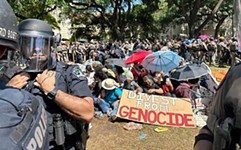Four in 10 UT Protesters Arrested Weren’t UT Affiliated. Were They “Outside Agitators”?
What UT calls outside disruption, students call a movement
By Lina Fisher and Austin Sanders, Fri., May 10, 2024
A review of 87 probable cause affidavits associated with arrests of demonstrators at the recent pro-Palestine protests at UT-Austin shows that roughly half are current UT students.
In an April 30 news release, UT announced that of the 79 people arrested April 29, “45 had no affiliation with UT Austin” and that “these numbers validate our concern that much of the disruption on campus ... has been orchestrated by people from outside the University.”
That figure appears to be about right. Using the current UT student and staff directory, an alumni directory, and affidavits from 87 protest arrests, the Chronicle determined about 35 people, or roughly 40% of those arrested, were neither students, staff, nor alumni.
What Austinites make of that number seems to depend on perspective: Those whom the university characterizes as outsiders and disrupters, protesters deem teammates in a movement opposing genocide in Gaza. (While mainstream outlets including Fox and CNN have described protests as antisemitic, the protesters and organizers we’ve interviewed at UT-Austin have consistently disavowed antisemitism. They emphasize the more than 13,000 Palestinian children killed so far, as well as Israel’s bombing of designated safe zones.)
Sam Law, a Jewish graduate student who was arrested, said UT’s language seems to paint cooperation as conspiracy. “It takes solidarity – our ability to stand together – and makes it sound like it’s some sinister thing. We are outsiders to Gaza, we are not living there, and we are standing up in solidarity with them.”
The idea that “outside agitators” came to UT to disrupt campus activity is one of the reasons UT has offered to justify the violent law enforcement response carried out by a trio of law enforcement agencies – the University of Texas Police Department, the Austin Police Department, and the Texas Department of Public Safety, whose presence was specifically requested by UT President Jay Hartzell during the first week of protest.
UT is not alone in employing this reasoning for its arrests. After revealing that 29% of the people arrested on Columbia’s campus last week were not students, NYPD’s Deputy Commissioner Kaz Daughtry said, “There is somebody funding this. There is somebody radicalizing our students.” The “outside agitator” trope has been circulated during many moments of civil unrest in American history: the Black Lives Matter uprisings of 2020, the 2014 Ferguson protests, and in an attempt to discredit the Freedom Riders during the Civil Rights Movement of the 1960s.
In fact, talk of “outside agitators” was so common during the Civil Rights Movement that Martin Luther King Jr. challenged the concept head-on in his oft-quoted 1963 “Letter From a Birmingham Jail.” He wrote: “Injustice anywhere is a threat to justice everywhere. We are caught in an inescapable network of mutuality, tied in a single garment of destiny. Whatever affects one directly affects all indirectly. Never again can we afford to live with the narrow, provincial 'outside agitator’ idea.”
UT protesters seem to have a similar perspective. James Clark, a UT alumnus and an attorney with the Austin Lawyers Guild defending protesters, said the “outside agitator” narrative “is an attempt to divide the movement.”
While student protesters embrace non-student support, are those non-students violating campus rules by protesting at UT? As the university explicitly clarified last year, non-students are allowed to protest on the UT campus. Six months ago, in a video Q&A for “Free Speech Week” at UT, a spokesperson referenced a 2019 law signed by Gov. Greg Abbott that, the spokesperson said, “allows members of the public to come on our campus and use our common outdoor areas for speech activities.” The university can make exceptions for the time, place, and manner in which speech occurs – including things like using amplified sound and blocking passageways – but they must be content-neutral, meaning the rules must be applied evenly no matter the speaker, the spokesperson explained.
Protest rules pamphlets UT handed out last week cited several reasons demonstrators could be forcibly removed from campus, including mask-wearing and building encampments. The Statesman noted that First Amendment experts say setting up an encampment would be grounds for removing protesters, and would qualify as civil disobedience, while prohibiting mask-wearing is a more dubious requirement, as the Constitution protects anonymous speech.
As of press time, charges against all 57 protesters arrested on April 24 have been dismissed, but the 79 who were arrested last Monday still face criminal charges (virtually all for criminal trespassing).
Got something to say on the subject? Send a letter to the editor.











